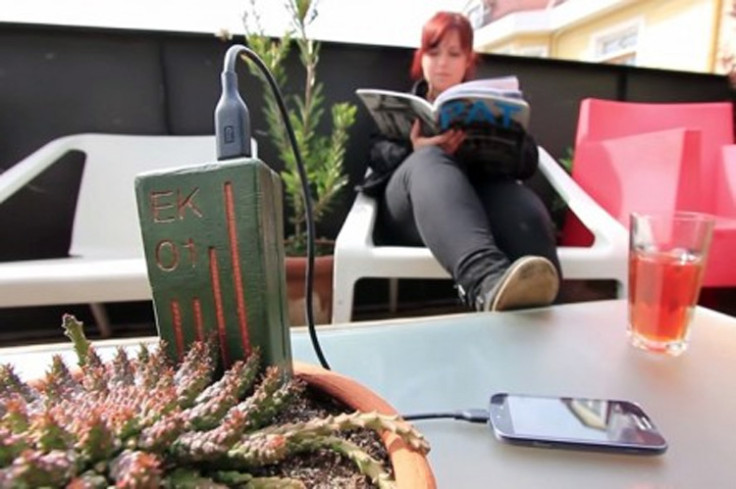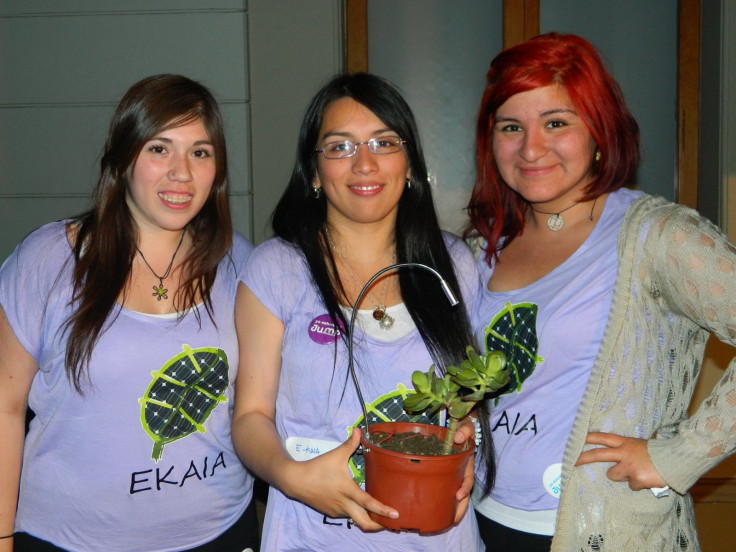E-Kaia: Here's a smartphone charger invented in Chile that takes energy from plants

Three engineers in Chile have invented a smartphone charger that is able to harness energy from plants in order to charge a phone, removing the need for an electrical power supply.
E-Kaia is the brainchild of Evelyn Aravena, Camila Rupcich and Carolina Guerrero, three engineering students who came up with the idea for an electricity-free smartphone charger when they were in university at the Duoc UC in Valparaíso and the Andrés Bello National University in 2009.
In the Netherlands, there is a solution called Plant-e that involves harnessing electricity from living plants, but many plants are required to create the energy needed. Instead, E-Kaia only needs one healthy plant.
A biocircuit is buried in a plant pot with a plant, with outputs leading out of the soil, and 5 volts and 600 milliamps can be harvested and converted into electrical energy without causing any damage to the plant. This amount of power can charge a smartphone in one and a half hours, according to the creators.
The portable ergonomic charging device prototype is still patent-pending, and the creators say that it is not just limited to charging phones– the technology can harvest enough electricity to charge LED lamps, fans, speakers and any type of low-power product that recharges its batteries using a USB port.
Using biocircuits to harness electricity
"We found ourselves with the same problem every day, and we wanted to find a solution to it. Living in a world that completely depends on electricity, people would be out of communication whenever that source fails," the creators state in a YouTube video promoting their solution.
"This is how we came up with a technology that allowed us to use natural resources, maintaining that energy and also the environment."
Aravena, Rupcich and Guerrero have been working for several years to bring their solution to market, and they have gained funding for their start-up through winning innovation competitions.
They received 5m Chilean pesos (£5,341, $8,266) in funding for winning the Jump Chile competition in 2013, and were also awarded the prestigious Avonni National Award of Innovation in 2014 by the Chilean government for creating value in the country.
E-Kaia announced on their official Facebook page that they are also now receiving financial backing from the Chilean Economic Development Agency (CORFO), and that although the solution is not yet ready for sale, they are working to commercialise their product this year.
Commercialisation hopes for 2015

"So far, we remain limited in our scale of what products can be charged at this level, and we are working to increase energy production," said E-Kaia.
"First, we will produce a small amount of stock that will allow us to develop our technology as a service. Once we have made a profit, we will invest it into a large-scale production of the device, reaching a higher number of customers via an online shop and finally retail."
The creators hope that the technology can one day be used for much bigger purposes, such as a park that is completely self-sufficient, powering street lamps from its own trees and plants, or to bring electricity to rural areas in Chile where there is limited access to power plants.
They are also quite optimistic that there will be a great demand for their solution: "There's a population of 692,138 people in our region, of which 21% are younger than 15 years of age and 11.8% are older than 60. Therefore, 61.7% of the population are our target customers.
"On average, every person acquires two mobile chargers in our area, which each cost around 4,990 Chilean pesos. Considering these numbers, we've got an average target of 4,634 million Chilean pesos, [garnered from] sales from 28% of the population."
© Copyright IBTimes 2025. All rights reserved.






















